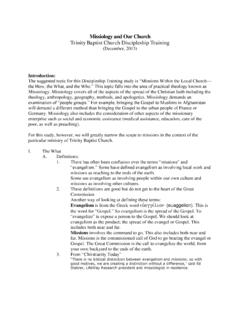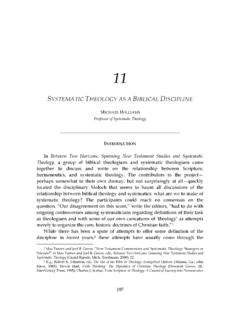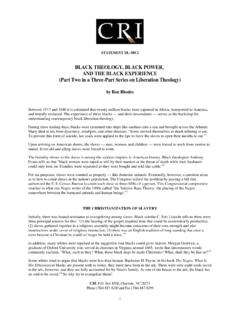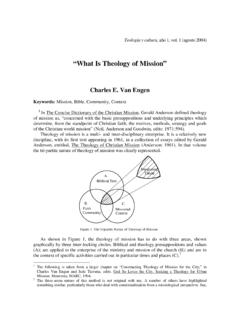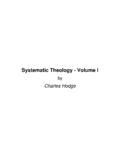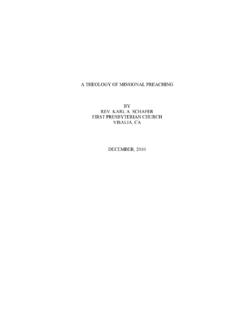Transcription of Covenant Theology Versus New Covenant Theology
1 " Covenant Theology Versus New Covenant Theology ". Trinity Baptist Church Discipleship Training (May 2006). Introduction: A proper understanding or the nature of " Covenant " is essential to the proper understanding of the Bible. It provides the proper relationship between the Old and New Testaments, between the Law and the Gospel; it provides the proper continuity of God's redemptive purpose being accomplished in the world. In this brief study we will examine the all important concept of Covenant . Bibliography: Berkhof,, Louis. Systematic Theology , Grand Rapids: Eerdmans, 1996. Bolton, Samuel. The True Bounds of Christian Freedom, Edinburgh: The Banner of Truth Trust, 2001. Dagg, J. L. Manual of Theology , Harrisonburg: Gano Books, 1990. Hodge, Charles. Systematic Theology , Grand Rapids: Eerdmans, 1986. House, H. Wayne. Charts of Christian Theology and Doctrine. Grand Rapids: Zondervan Publishing House, 1992. International Standard Bible Encyclopaedia, Volume II, Grand Rapids: Eerdmans, 1939.
2 Reisinger, Ernest C. The Law and the Gospel, Philipsburg: Presbyterian and Reformed, 1997. Witsius, Herman. The Economy of the Covenants Between God and Man, Kingsburg: den Dulk Christian Foundation There are three basic schools of thought on God's Covenant : Dispensational Theology I. Dispensational Theology maintains a hermeneutic of strict literal biblical interpretation. II. Dispensationalism teaches that history is divided into various periods or stages (dispensations). A. Proponents have listed as many as seven: innocence, conscience, human government, promise, law, grace, kingdom. 1. There is an absolute discontinuity between the Old and New Covenants 2. God is carrying out three distinct programs: one for the Jews, one for the Church, and one for the nations. B. Dispensationalism teaches that God has two separate and distinct people . National Israel and the church. Israel is God's earthly people, the church is His heavenly people. They deny the spiritual identity of Israel with the church.
3 1. God has two separate plans for these two distinct people. An earthly kingdom for Israel postponed until Christ's coming and establishment of His earthly kingdom. A heavenly kingdom for the church existing in eternity 2. They interpret the church as only pertaining to this present dispensation (it does not include Old Testament saints). C. Most Dispensationalists teach that God has two plans of salvation: 2. 1. Old Testament believers were saved by works (keeping the Mosaic Law). and sacrifices. 2. New Testament believers are saved by grace through faith. Covenant Theology I. Covenant Theology sees God's historical outworking of redemption grounded upon God's eternal Covenant . A. The Covenant of Redemption 1. All historical Biblical covenants are grounded upon God's eternal Covenant and are to be understood in relationship to God's eternal plan.. 2. In this eternal Covenant the Father gives His Son to be the eternal head and Redeemer of the elect and the Son gives Himself to be the Surety for them.
4 A. The Father has elected a people by His unconditional grace and has pledged to give them to His Son as His inheritance. b. The Son has pledged to serve as the Redeemer and Mediator of God's elect people. 3. This Covenant is between the Father and His Son, not between God and man. The Covenant was proposed by the Father and accepted by the Son. 4. The Covenant of redemption was conditional upon obedience but Jesus accepted the Covenant on behalf of the elect. Jesus was made under the law and met all of its demands. He became obedient even unto death (Phil. 2:8). B. The Covenant of Grace Herman Witsius The Covenant of grace is a compact or agreement between God and the elect sinner; God on his part declaring his free goodwill concerning eternal salvation, and every thing relative thereto, freely to be given to those in Covenant , by, and for the mediator Christ; and man on his part consenting to that goodwill by a sincere faith.. (Witsius, Herman.)
5 The Economy of the Covenants Between God and Man, Book II, Chapter 1, Page 164.). 1689 Confession: (Chapter 7:2) - Moreover, man having brought himself under the curse of the law by his fall, it please the Lord to make a Covenant of grace, wherein he freely offereth unto sinners life and salvation by Jesus Christ, requiring of them faith in him, that they may be saved; and promising to give unto all those that are ordained to eternal life, his Holy Spirit, to make them willing and able to believe.. 1. In time God's eternal Covenant of redemption is interposed upon the elect through the Covenant of grace. The Covenant of redemption undergirds the Covenant of grace. 2. The Gospel that offers Jesus Christ to sinners is an invitation to enter into a Covenant relationship with God. 3. This involves the fulfillment of the eternal Covenant of Redemption. The Covenant of grace presupposes the eternal Covenant and is founded upon it. 4. The Requirement of the Covenant a.
6 Faith Romans 10:9-11 "That if thou shalt confess with thy mouth the Lord Jesus, and shalt believe in thine heart that God hath raised him from the dead, thou shalt be saved. For with 3. the heart man believeth unto righteousness; and with the mouth confession is made unto salvation. For the scripture saith, Whosoever believeth on him shall not be ashamed.". Acts 16:30-31 "And brought them out, and said, Sirs, what must I do to be saved? And they said, Believe on the Lord Jesus Christ, and thou shalt be saved, and thy house.". b. Repentance Acts 2:37-38 "Now when they heard this, they were pricked in their heart, and said unto Peter and to the rest of the apostles, Men and brethren, what shall we do? Then Peter said unto them, Repent, and be baptized every one of you in the name of Jesus Christ for the remission of sins, and ye shall receive the gift of the Holy Ghost.". Acts 3:19 "Repent ye therefore, and be converted, that your sins may be blotted out, when the times of refreshing shall come from the presence of the Lord;".
7 C. Faith and repentance is essential for entering into the New Covenant (1) But this too comes by grace (2) Regeneration is essential for faith and repentance d. Faith & repentance are necessary for are essential for entrance into a Covenant relationship with God and are a prerequisite for new Covenant Baptism Acts 2:38 Then Peter said unto them, Repent, and be baptized every one of you in the name of Jesus Christ for the remission of sins, and ye shall receive the gift of the Holy Ghost.. II. There is a continuity between the Old Testament and the New Testament. A. The Old Covenant isn't replaced by the New Covenant but is fulfilled by the New Covenant . B. The Old Covenant was based upon a nation chosen by grace See Deuteronomy 7:6-8. 1 This Covenant was conditional it could be broken and was broken 2 It involved an elect nation of which not all knew and obeyed God. You could be in the Old Covenant but not know God savingly (an election within the election).
8 3. The Old Covenant was dedicated by the shedding of blood Hebrews 9:18 "Whereupon neither the first testament was dedicated without blood.". Hebrews 9:22 "And almost all things are by the law purged with blood; and without shedding of blood is no remission.". 4. The nation would ultimately be rejected of God But not true Israel!! Luke 13:28-29 There shall be weeping and gnashing of teeth, when ye shall see Abraham, and Isaac, and Jacob, and all the prophets, in the kingdom of God, and you yourselves thrust out. And they shall come from the east, and from the west, and from the north, and from the south, and shall sit down in the kingdom of God.. 4. Matthew 21:43 Therefore say I unto you, The kingdom of God shall be taken from you, and given to a nation bringing forth the fruits thereof.. a. God would not forsake those with circumcised hearts Deuteronomy 10:16 "Circumcise therefore the foreskin of your heart, and be no more stiffnecked.". b.
9 God would not forsake His remnant Jeremiah 23:3 "And I will gather the remnant of my flock out of all countries whither I have driven them, and will bring them again to their folds; and they shall be fruitful and increase. Jeremiah 31:7 "For thus saith the LORD; Sing with gladness for Jacob, and shout among the chief of the nations: publish ye, praise ye, and say, O LORD, save thy people, the remnant of Israel.". c. God would not forsake the true Israel because of the election of grace Romans 9:6-8 "Not as though the word of God hath taken none effect. For they are not all Israel, which are of Israel: Neither, because they are the seed of Abraham, are they all children: but, In Isaac shall thy seed be called. That is, They which are the children of the flesh, these are not the children of God: but the children of the promise are counted for the seed.". C. The eternal Covenant of Redemption is ultimately fulfilled in the New Covenant 1. The New Covenant is based upon people who have new hearts.
10 The same Ten Commandments that were written upon the stone tablets are now written upon our hearts - (The Ten Commandments have not been abolished). See Jeremiah 31:31-34; Ezekiel 36:24-28. a. In the New Covenant everyone will know the Lord b. In the New Covenant everyone will obey and honor the Lord 2. The New Covenant cannot be broken because it is not based upon our obedience to the Law but upon Christ's obedience a. Jesus Christ is the Guarantor Hebrews 7:22 "By so much was Jesus made a surety of a better testament.". See Hebrews 8:6-13. 1 Corinthians 1:30 "But of him are ye in Christ Jesus, who of God is made unto us wisdom, and righteousness, and sanctification, and redemption:". b. Jesus sealed the Covenant with His own blood Matthew 26:28 "For this is my blood of the new testament, which is shed for many for the remission of sins.". Mark 14:24 "And he said unto them, This is my blood of the new testament, which is shed for many.". 1 Corinthians 11:25 "After the same manner also he took the cup, when he had supped, saying, This cup is the new 5.

